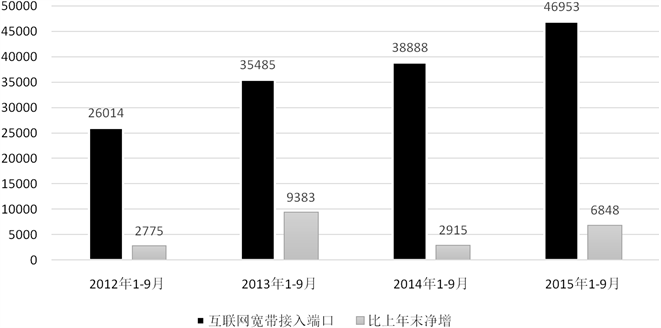1. 引言
2013年,在全球智慧城市建设浪潮下,国家发改委、工信部等八个政府部门共同起草了《关于促进智慧城市健康发展的指导意见》,指出要建设一批各具特色、成效显著、具有示范效应的智慧城市,在保障和改善民生、创新社会管理、保护生态环境、调节产业结构等方面取得积极成效,为我国转型发展取得新模式。近年来,在“十三五”以及各地政府和企业的共同推动下,辽宁省智慧城市在基础设施、项目建设等方面取得显著性进展,部分智慧城市专项应用纷纷上线,随着智慧城市建设的逐步推进,我省智慧城市运营整体能力也得到有效提升 [1] 。
知名信息技术研究分析公司Gartner预估,2017年将有23.3亿的联网物件被用于智慧城市,这个数字较2016年大增42%。2017年以前,智能商业大厦是物联网的最大用户,之后将由智能家居跃居龙头。市场研究机构PMR预估,全球智慧城市的市场需求到2026年将高达3.5亿美元,这个数字是目前市场规模的5倍。知名咨询公司technavio预测,2016到2020年,智能化基础设施建设每年有望达到的增速为23%,这是智能城市解决方案的最大一块分支业务。
中投顾问对2017~2021年中国智慧城市IT投资规模预测,2014年,我国智慧城市IT投资规模达2060亿元,较2013年同期增长17.0%;2015年,我国智慧城市IT投资规模达2480亿元,较2014年同期增长20.4%。综合以上因素,专家预计,2017年我国智慧城市市场规模将达到6.0万亿元,未来五年(2017~2021)年均复合增长率约为32.64%,2021年市场规模将达到18.7万亿元,图1为我国移动电话基站发展情况图。
2. 辽宁省智慧城市发展现状
2.1. 辽宁智慧城市的建设
在“互联网+”辽宁省智慧城市创新与发展基本建设与基础社会服务指数排名中,大连和沈阳分别以
 注:数据来源于工信部网站
注:数据来源于工信部网站
Figure 1. Development of mobile phone base stations in China
图1. 我国移动电话基站数发展情况
104.06分和79.04分位居东北城市排名中的前两位,阜新以35.88分位居第7位。2015年,根据科技部发布的《中国区域创新能力报告》,辽宁省近年来经济发展衰退,与其创新实力息息相关,区域创新能力及高新技术产业有待提高,其次城市信息化升级的条件逐步建成,基础网络基本覆盖,在基础网络建设是智慧城市建设的首要任务的同时,政府政策支持体系政务信息系统则需要不断完善。
智慧城市建设涉及到诸多前沿产业领域,如云计算、传感技术等,这些产业推动智慧城市发展,有利于产业结构优化的升级,在我省经济环境大背景下,智慧城市的发展为其提供网络智能化平台,拉长产业链条,提升产业层次,支撑推动城市转型升级,优化产业布局和均衡发展、有效促进资源合理共享,为智能交通、物联网、智能电网、应用软件与文化创意和智能终端等新一轮加速发展提供更新层次挑战,同时为辽宁省发展与经济复苏注入新的活力 [2] 。
2.2. 辽宁省智慧城市发展模式
1、政府主导型的发展模式
政府主导型的发展模式,是由政府制定明确的“智慧城市”发展战略,加大基础设施投资,支持和鼓励政府、市民以及企业等主体之间形成网络和互动关系,引导全社会参与智慧城市建设,其劣势为城市管理主体的单一性与城市功能的单一性相适应,而当今社会剧烈的变化和挑战构成了全新城市管理大背景。
2、市场导向型的发展模式
在市场机制配置资源的前提下,市场导向型的发展模式则是建设主体在各自的利益需求和市场竞争压力下,不断寻求技术上的科技创新与科技突破,自发地形成城市地区的“智慧产业”并且有利于新的科技创新的环境。
3、混合型发展模式
混合型发展模式同时吸收政府与市场两种力量。目前,我国正处于智慧城市建设的起步阶段,应实现两种模式的长处的有机结合 [3] 。因此智慧城市的建设,既是以硬件基础设施建设为主的城市建设改造工程,又是城市系统重新再造的过程。
2.3. 辽宁智慧城市面临发展环境
在国家与辽宁省政府出台有关指导意见的同时,要加快建设高新技术园区及创新产业园的步伐,注重人才的引进,使经济上投资、出口和消费三大需求保持较好协调增长态势,在全国智慧城市发展浪潮下我省应该增加高新产业带、智慧试点城市以及信息技术研发中心的建设,加强自主创新、引领全省各地区经济发展方式的转变,大力开展云计算基础设施的研究。新一代信息技术快速发展,使之运用于智慧城市建设,造福人民群众。
目前,我省面临着经济结构调整,产业转型升级的关键时期,在这种形势下,城市也同样面临着转型压力 [4] ,因此,在建设智慧城市的道路上,城市规划必须在理念实施路径上改变其思维方式从而实现转型创新。
3. 辽宁省智慧城市未来走势
3.1. 辽宁省智慧城市存在的问题
智慧城市的本质是人类的活动信息汇集成一个城市在信息空间的映像,2016年,我省智慧城市建设取得显著的成绩,然而从整体上看,大多数仍处于探索阶段,还存在智能基础设施建设落后、信息资源整合缺乏标准、网络和信息安全面临严重威胁、技术应用对产业带动效应不明显等问题,图2为智慧城市规划流程。
第一,部分地方对智慧城市建设目标和路径认识不足。当前,一些政府管理者对智慧城市认知有限,对智慧城市的建设目标认识不清晰,未能理清各种要素之间的逻辑关系,建设智慧城市的正确路径则为谋划智慧城市发展主动脉。
第二,国内信息开放程度不足,未能迅速打开横向网络。各政府部门间不愿公开、分享数据,导致我国智慧建设的一个瓶颈就是“信息孤岛”的问题 [5] 。没有数据之间的共享,就没有办法让数据产生深度价值和综合价值,也就难以实现智慧城市的发展。此外,因为目前政府部门有各自独立的垂直信息系统,所以也存在着数据不统一、标准化程度不高、互联互通程度不足、部门各自为政的现象。
第三,智能基础设施滞后影响整体进展。基础设施是承载智慧城市运行的重要载体,基础设施智能化水平不足,在一定程度上影响了智慧城市的整体推进。当前,本省智慧城市集成商实力薄弱,市场上实力过硬的智慧城市建设运营主体和集成商,使得本地企业相对外资外地企业的优势则更不为明显。
第四,技术应用对产业的带动效应不明显。大多数城市对智慧城市的推进处于规划阶段和顶层设计阶段,相关应用项目未大面积启动,信息技术仍以碎片化的形态存在于各个领域以及产业,相关具体领域的规模效应尚未有所显现。
第五,网络和信息安全面临严重威胁。智慧城市网络和信息安全面临更加严峻的考验,一些重要信息系统和个人安全数据缺乏保护,导致智慧城市建设运营管理部门对信息安全突发事件的响应协同能力不足 [6] 。
3.2. 促进智慧城市建设的对策建议
(一) 完善信息基础设施,构建城市信息服务平台。完善的智慧基础设施是智慧城市运行的保障和基础。2014年中央网络安全和信息化领导小组提出了把我国建成网络强国的战略目标,指出“要促进信息消费、实施宽带中国战略、推进宽带乡村工程,大幅度提高互联网的网速”的观点。因此,智慧城市建设要按照适度超前的目标,建设宽带、安全、融合的信息化基础设施(图3)。
(二) 创新管理体制,为智慧城市建设提供制度保障。智慧城市建设广泛涉及政府多个部门,需要高效、统一的协调推进机制,要从体制机制上充分给予保障,并要求智慧城市建设的领导机构具有权威性。智慧城市建设应以大局利益为重,通过科学测评方法,寻求成本和收益之间的最佳平衡点,预测出智慧
 注:数据来源于工信部网站
注:数据来源于工信部网站
Figure 3. Development of Internet broadband access ports in China
图3. 我国互联网宽带接入端口发展情况

Table 1. Comparative analysis of smart cities at home and abroad
表1. 国内外智慧城市对比分析
城市建设目标的可行性,各部门应该构建一个可阶段性改变城市发展的方案机制。因此,各级政府应做到以民众需求为发展动力,形成良性互动,确保智慧城市建设的有效实施。
(三) 完善投融资机制,多渠道获取资金的保障。加大政府的财政支持力度是我省、全国乃至世界智慧城市建设所取得的共同经验,在智慧城市建设的初期,财政投入应该突出扶持的重点,通过政府与相关科研机构、服务提供商和产业重点单位签订战略合作协议,以引进建设资金,将公共服务领域作为重点,大胆稳步前行,表1为国内外智慧城市对比分析 [7] [8] 。
(四) 合理规划统一标准,推动智慧城市项目。智慧城市建设,必须整体布局、合理规划、互通互联,才能充分发挥总体效能,避免重复建设。在方便公众的同时,形成社会信息的实时数据分析体系以及大量捕获,全面提升公共管理和服务能力。
智慧城市是继数字城市和智能城市后城市信息化所形成的高级形态,是工业化、信息化和城镇化深度融合的产物,是运用新一代信息技术,促进城市规划、建设、服务和管理智慧化的新理念和新模式。因此,智慧城市转型创新发展成为城市转型的重要动力。
4. 结语
现如今,辽宁省智慧城市发展处于转型创新阶段,因此掌握好国家经济政策,认清现如今我省智慧城市发展处于何种阶段,跟随政府主导和市场调节双方面进行转型创新,认真分析我省智慧城市发展存在的问题以及如何解决这些问题和未来的展望,研究开拓出辽宁省智慧城市转型创新发展的新路径,使智慧城市产业发展更全面,更服务于百姓。
基金项目
辽宁省科协创新智库资助项目,项目编号LNKX2016C11。